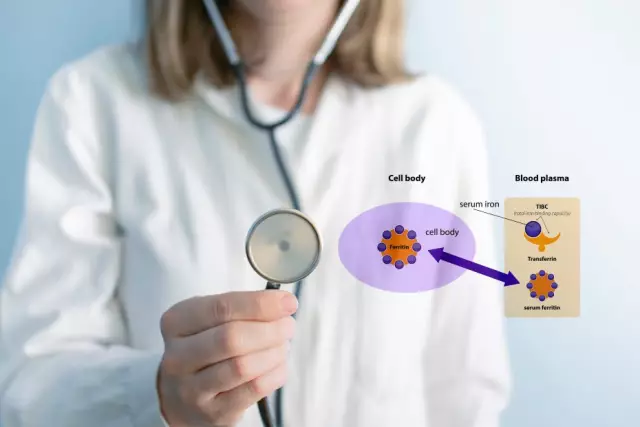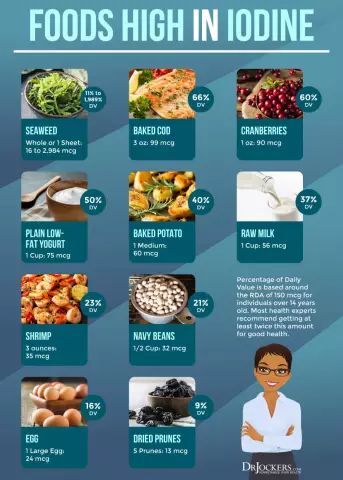- Author Rachel Wainwright wainwright@abchealthonline.com.
- Public 2023-12-15 07:39.
- Last modified 2025-11-02 20:14.
9 signs of iodine deficiency in the body
Iodine is one of the thirty most important trace elements in our body. The main role of iodine is in the synthesis of thyroid hormones of the thyroid gland - the substances responsible for most metabolic processes. It is known that thyroid hormones consist of more than 65% iodine. Its deficiency leads to a decrease in the production of hormones and, as a result, the development of hypothyroidism. Long-term iodine deficiency can become a source of problems of the cardiovascular, bone, digestive systems, obesity, neurological disorders, as well as lagging in physical and mental development.
According to statistics, more than 35% of Russians suffer from iodine deficiency to one degree or another, and in the northern regions this figure reaches 80%. Despite its prevalence, the disease is often detected late, since changes caused by iodine deficiency are often confused with overwork, other diseases, and pregnancy. The severity of the symptoms of iodine deficiency depends on many factors, but its main signs can be detected even with moderate iodine deficiency. Let's talk about them below.
Chronic fatigue
Lethargy, drowsiness, loss of strength are the first things that people pay attention to when the concentration of thyroid hormones in the blood decreases, whose tasks include providing the body with energy. The peculiarity is that these signs can occur without any prerequisites and do not go away after rest. Chronic fatigue occurs in 99% of cases of iodine deficiency and is often accompanied by muscle fatigue for no reason. This is the first alarm bell, meaning that you should consult a doctor and get tested for the level of thyroid-stimulating hormones in the blood.

Source: depositphotos.com
Weak immunity
Weakness of the immune system manifests itself in the form of frequent and recurrent colds, viral, parasitic, fungal diseases, and slow wound healing. The use of general measures to strengthen the body (setting a daily regimen, hardening, taking immunomodulators), as a rule, helps badly. In this case, you can get rid of immunodeficiency only by eliminating its root cause by taking means containing iodine ("Iodomarin", potassium iodide, etc.), or thyroid drugs.

Source: depositphotos.com
Edema
Edema is an obvious symptom of iodine deficiency. The most common localization of edema in this condition is under the eyes; swelling of the legs and arms can also be observed. Moreover, the use of diuretics to eliminate edema will be not only useless, but also dangerous: useful substances, including trace elements, are washed out of the body, and the water-salt balance is disturbed.

Source: depositphotos.com
Menstrual irregularities
An unstable menstrual cycle is a symptom of the initial stage of iodine deficiency, since a lack of iodine directly affects the work of the hormonal system. The state of iodine deficiency in women can be fraught with infertility and premature menopause. The lack of iodine is no less dangerous during pregnancy: the absence of a vital element can adversely affect the intrauterine development of the fetus and lead to spontaneous abortion, stillbirth, and congenital pathologies.

Source: depositphotos.com
Anemia
Due to a decrease in metabolic activity, iodine deficiency is often accompanied by iron deficiency anemia, a disease associated with a lack of iron in the blood. In this case, anemia is usually mild and usually manifests itself already in the mature stage of hypothyroidism. The main symptoms of iron deficiency anemia are tinnitus, dizziness, weakness, pallor.

Source: depositphotos.com
Overweight
An uncontrolled increase in body weight is one of the symptoms of a serious lack of iodine in the body. Overweight in this case is mainly due not to the presence of fat mass, but to edema caused by metabolic disorders. Connective tissue becomes more susceptible to fluid, and, in addition to excess weight, iodine deficiency is manifested by thickening of the skin, puffiness of the face, limbs, swollen tongue and lips. Due to extensive edema in a severe stage of hypothyroidism, hearing loss, difficulty with nasal breathing, and hoarseness may occur.

Source: depositphotos.com
Hypotension
Disorders of the cardiovascular system are a sign of hypothyroidism that has developed against the background of iodine deficiency, and to a large extent. Due to circulatory disorders in people with hypothyroidism, a complication may occur in the form of hypotension - a decrease in blood pressure. This condition is characterized by weakness immediately upon waking, dizziness, headache, shortness of breath, heart palpitations, sweating, and fatigue. It is important to remember that hypotension often accompanies other endocrine diseases, it becomes the result of stress, uncontrolled intake of drugs, a sedentary lifestyle, having nothing to do with iodine deficiency.

Source: depositphotos.com
Decreased intelligence
Problems in the work of the brain, manifested in the form of a decrease in attention, ability for intellectual activity, memory impairment, can also signal a lack of iodine in the body. As a result of a weakening of the metabolism of brain cells, a person memorizes dates, events, faces worse, solves difficult problems with difficulty, and ceases to be creative. If iodine deficiency is not eliminated at this stage, the next stage is deep depression.

Source: depositphotos.com
Bad mood and depression
Brain disorders that have not passed without leaving a trace serve as a starting point for the development of psychological problems. There is a deterioration of the emotional background, apathy, passivity, dejection, a negative outlook on events appear, which in 5-12% of cases turn into severe depression. A hallmark of this condition with iodine deficiency is weakness, the absence of any desire to improve their condition, which should be known to the patient's relatives. It is necessary to help him, to encourage him to seek treatment.

Source: depositphotos.com
Preventing iodine deficiency is always easier than treating it. The average daily intake of iodine for an adult is 120-150 mcg. It can be obtained primarily from sea fish, algae, fish oil, iodized salt, meat, fruits and dairy products.
YouTube video related to the article:

Maria Kulkes Medical journalist About the author
Education: First Moscow State Medical University named after I. M. Sechenov, specialty "General Medicine".
Found a mistake in the text? Select it and press Ctrl + Enter.






